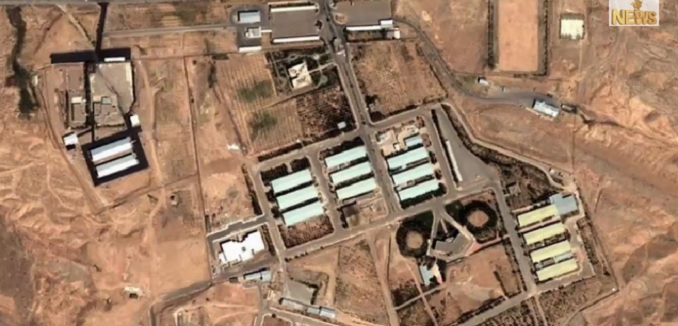A range of Western news outlets reported Monday morning that an explosion had rocked the Iranian military base at Parchin – where the UN’s nuclear watchdog (IAEA) suspects Iranian scientists conducted work related to nuclear weaponization – just a day before an IAEA team was set to land in the Islamic republic in an bid to secure access to sites where military-related atomic work is thought to have occurred. The BBC conveyed a report from the regime-linked Iranian Students News Agency, which described a fire in “explosive materials production unit” and also quoted Iranian officials regarding the incident:
The pro-reform website Sahamnews said the explosion on Sunday evening was so intense that windows of buildings 15km (nine miles) away were shattered.
The glare from the blast could also be seen from a great distance, the report added.
Isna, quoting Iran’s defence industries organisation, said: “Unfortunately, due to the incident, two workers of this production unit lost their lives.”
Reuters conveyed a similar report from Iran’s official IRNA news outlet, describing a fire at an explosives factory somewhere east of Tehran. Both outlets also quoted an Iranian opposition website putting the exact location as inside the Parchin complex, though analysts cautioned that the latter reports were not entirely trustworthy.
The rumors in any case renewed focus on Parchin specifically and more broadly on widespread suspicions – described across years of IAEA reports – that the Iranian military engaged in atomic research, up to and including experiments related to the construction and detonation of nuclear warheads. The IAEA has been seeking access to Parchin since 2005, and has concluded that Iranian scientists conducted tests at the facility that were likely aimed at the successful detonation of a nuclear warhead.
The Israelis last month revealed that they had intelligence, which they assessed as “highly reliable information,” documenting full-blown weaponization work at Parchin.
IAEA nuclear experts arrived Monday night in Tehran in anticipation of Tuesday talks aimed at securing access that Iran is obligated to give to Parchin and beyond, after the agency last month issued a blistering report accusing Iran of stonewalling inspectors, destroying evidence, and sabotaging verification efforts. At stake are long-standing international demands that Iran come clean about the so-called “possible military dimensions” (PMDs) of its nuclear program.
Iranian disclosure is considered essential to setting a baseline for any future verification regime: In the most basic sense, inspectors would need a full accounting of Iran’s atomic work to ensure that the Iranians had ceased such work. American lawmakers and Western diplomats have long emphasized the degree to which full Iranian disclosure must be part of any robust and credible deal between Tehran and the West. Potential backsliding by the P5+1 on the issue has generated concerns among analysts not just about the substance of any agreement, but also about the credibility of any future non-proliferation demands.
Danielle Pletka, senior vice president for foreign and defense policy studies at the American Enterprise Institute, told journalists on a Monday conference call held by The Israel Project that IAEA credibility was closely linked to the fate of the Non-Proliferation Treaty writ large:
“At that point you have to ask yourself, why does the IAEA exist? What exactly are they safeguarding? If, in fact, it’s OK for a rogue state, a state sponsor of terrorism, a threat to its neighbors, a dictatorship to use the NPT to get a nuclear weapon and to argue that it has a right all of the technology, then how exactly are they going to make this argument to anybody else? How are they going to stand up and say that the NPT is actually an instrument to control the spread of nuclear technology and to manage the spread of nuclear technology, rather than to simply arm absolutely anyone who wants it and can afford it with nuclear weapons? I think that the very existence and credibility of the NPT and the IAEA hang in the balance. And I think I suspect that there are many arms control people, a dying breed, who would agree with that.”
[Photo: News Time 2014 / YouTube]




